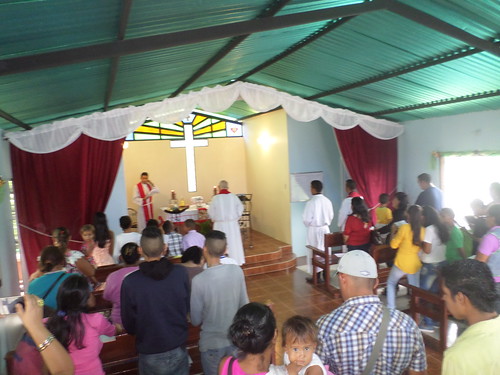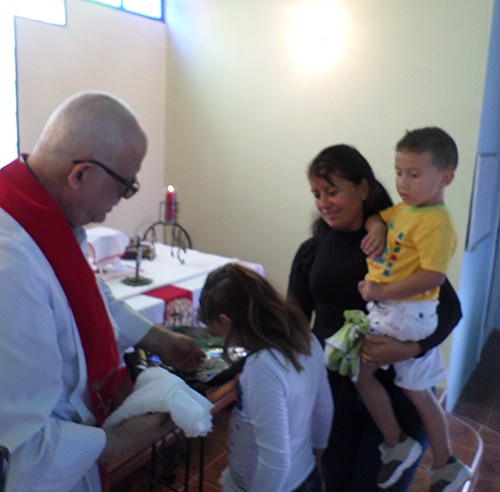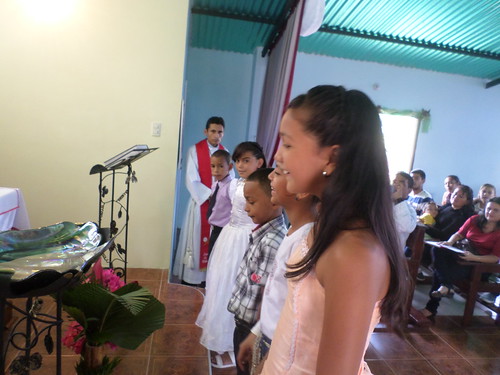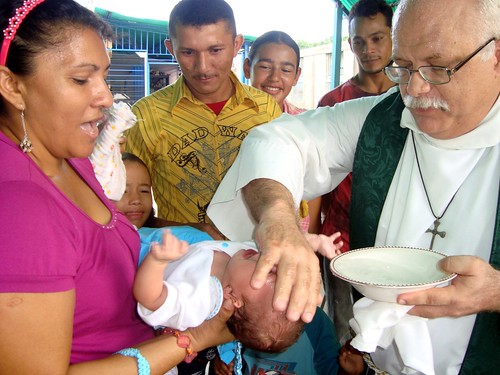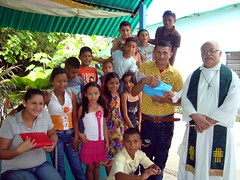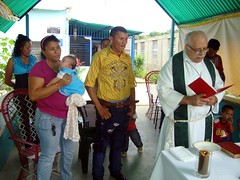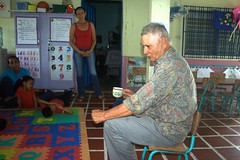On January 8, 2017, we celebrated the Baptism of our Lord (Matthew 3:13-17) by baptizing three and receiving five as communicant members by rite of confirmation.
Those baptized were:
Those publicly professing the faith and receiving first communion were:
- Escarleth Mariuzy Ruíz;
- Maryuri Daniela Rojas;
- Eduar José Garrido;
- José Ignacio Garrido;
- Frenyerlin Novoa.
During the dedication our chapel which opened the Divine Service, I said: Now I dedicate and set apart the edifice of Epiphany Lutheran Church and all of its (communion) vessels to the glory and honor of almighty God and the edification of our faith, which is in Jesus Christ. In the name of the Father, the Son and the Holy Spirit. Amen.
It was the first time that I publicly named our congregation, “Epipany Lutheran Church.” Later I welcomed those receiving first communion in the name of Epiphany Lutheran Church and signed all the certificates of baptism and confirmation on behalf of Epiphany Lutheran Church.
Up until now we have identified this place, this project, as Epiphany Lutheran Mission. So what's in a name? Are we a “church” or a “mission”? Well, both, if properly understood.
The first baptism was performed here in 2005. there have 19 baptized and 27 received as communicant members by confirmation or reaffirmation of faith. Our Lord promised that “wherever two or three or gathered in My name, there am I in the midst of them” (Matthew 18:20). This is after He speaks of how to deal with an erring brother and says of the church, “Truly, I say to you, whatever you bind on earth shall be bound in heaven, and whatever you loose on earth shall be loosed in heaven. Again I say to you, if two of you agree on earth about anything they ask, it will be done for them by my Father in heaven.” This is understood as the bestowing the Office of the Keys on the church on earth, even the smallest of local churches.
C.F.W. Walther, in his landmark work, “Church and Ministry”, says “the church”, properly understood, is the aggregate of all those who, called out of the lost and condemned human race by the Holy Spirit through the Word, truly believe in Christ and by faith are sanctified and incorporated in Christ. In this true church, there are no liars or hypocrites. The total membership of this true church is known only to God, who knows the most intimate secrets of the heart, thus it is “invisible” to us.
However, Scripture also calls the visible aggregate of all the called, that is, of all who confess and adhere to the proclaimed Word and use the sacraments, which consists of good and evil persons, “church”. So also it calls local congregations, found here and there, where the Word of God is preached and the sacraments administered, “churches”. Wherever there are Word and sacraments, there will be found true Christians, even though there may be false Christians in the visible assembly. God ultimately will judge those put on a false show of faith (Matthew 13:24-30), but for the sake of the faithful in the visible assembly, He recognizes the right of the smallest congregation, even one consisting of two or three people, as possessing all of the authority which He has given to the whole church. That is, to proclaim God's Law, the message of judgment, to the unrepentant, but the Gospel, the message of salvation and forgiveness, to the repentant sinner.
Even the smallest congregation has the right and the responsibility to call and place men, who have been properly prepared and examined, into the office of the holy ministry, which is the office of publicly proclaiming the Word and administering the sacraments in the name of Christ and His church. Local congregations also have the right and, indeed, the responsibility to send and support called and ordained ministers to preach and administer the sacraments in places where a stable community of professed Christians has not been established.
“For everyone who calls on the name of the Lord will be saved. but how are they to call on Him in whom they have not believed? And how are they to believe in Him of whom they have never heard? And how are they to hear without someone preaching? And how are they to preach unless they are sent? As it is written, How beautiful are the feet of those who preach the good news!” Romans 10:13-15.
This generally is what is meant by “mission” or “mission work”. But it is the same ministry of the church: Preaching and administration of the sacraments. The Great Commission ties it all together: And Jesus came and said to them, All authority in heaven and on earth has been given to me. Go therefore and make disciples of all nations, baptizing them in the name of the Father and of the Son and of the Holy Spirit, teaching them to observe all that I have commanded you. And behold, I am with you always, to the end of the age.” (Matthew 28:18-20).
But we may distinguish, in common usage, between those who send and those who receive. We speak of a “mission” or “mission congregation” as a group of believers who do not have the resources to materially support a ministry in one location, much less send missionaries to distant shores. Other congregations (“churches”) may contribute toward the support of a resident pastor, construction of facilities or other needs.
Ideally a newly planted congregation would quickly grow to the point where it can not only support its own ministry, but mission projects outside its own locality. But any number of factors, both spiritual and material, may impede that progress.
Epiphany Lutheran Church of La Caramuca, Venezuela, has been a local church effectively since that first baptism in 2005. We remain a mission in both senses. We continue to try and reach those who do not know the hope of eternal life in Christ with the Gospel, and to show them God's love in action by helping them with their material needs. Also, we continue to depend on donations from concerned individuals, mission societies and other congregation in order to continue being a blessing to our community.
Most of the families that we serve have for generations been plagued by instability in work and personal relations. It was one of our objectives from the beginning to help them break the cycle of poverty imposed by false beliefs through Christian education. Now the entire country is gripped by an economic crisis in a world that seem to be gripped by fear and uncertainty. We ask, that if you have the means, please consider helping keep shining a light in the present darkness. You may donate on-line at this Web site. Thank and God bless.
